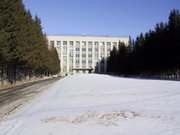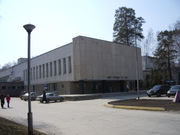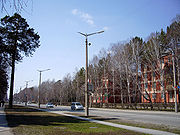
Akademgorodok
Encyclopedia


Russia
Russia or , officially known as both Russia and the Russian Federation , is a country in northern Eurasia. It is a federal semi-presidential republic, comprising 83 federal subjects...
n city Novosibirsk
Novosibirsk
Novosibirsk is the third-largest city in Russia, after Moscow and Saint Petersburg, and the largest city of Siberia, with a population of 1,473,737 . It is the administrative center of Novosibirsk Oblast as well as of the Siberian Federal District...
, located 20 km south of the city center. It is the educational and scientific centre of Siberia
Siberia
Siberia is an extensive region constituting almost all of Northern Asia. Comprising the central and eastern portion of the Russian Federation, it was part of the Soviet Union from its beginning, as its predecessor states, the Tsardom of Russia and the Russian Empire, conquered it during the 16th...
(54.851°N 83.106°E)
It is located in the center of birch
Birch
Birch is a tree or shrub of the genus Betula , in the family Betulaceae, closely related to the beech/oak family, Fagaceae. The Betula genus contains 30–60 known taxa...
and pine
Pine
Pines are trees in the genus Pinus ,in the family Pinaceae. They make up the monotypic subfamily Pinoideae. There are about 115 species of pine, although different authorities accept between 105 and 125 species.-Etymology:...
forest on the shore of the Ob Sea
Novosibirsk Reservoir
Novosibirsk Reservoir or Novosibirskoye Reservoir , informally called the Ob Sea , is the largest artificial lake in Novosibirsk Oblast and Altai Krai created by a dam on the Ob River near Novosibirsk. The dam, built in 1956, is for generating hydroelectric power. The reservoir is 160 km long...
, a man-made reservoir on Siberian river Ob
Ob River
The Ob River , also Obi, is a major river in western Siberia, Russia and is the world's seventh longest river. It is the westernmost of the three great Siberian rivers that flow into the Arctic Ocean .The Gulf of Ob is the world's longest estuary.-Names:The Ob is known to the Khanty people as the...
. Formally it is a part of Novosibirsk city, and has never been a closed city
Closed city
A closed city or closed town is a settlement with travel and residency restrictions in the Soviet Union and some of its successor countries. In modern Russia, such places are officially known as "closed administrative-territorial formations" ....
like, for example, Seversk
Seversk
Seversk is a closed city in Tomsk Oblast, Russia, located northwest of Tomsk on the right bank of the Tom River. Population: Founded in 1949, it was known as Pyaty Pochtovy until 1954 and as Tomsk-7 until 1992. Town status was granted to it in 1956.The current Chair of the City Duma and Mayor...
.
Located within Akademgorodok is Novosibirsk State University
Novosibirsk State University
Novosibirsk State University was founded in May 1959 in the USSR by Soviet academicians Mikhail Alekseevich Lavrentiev, Sergei Lvovich Sobolev and Sergey Alekseyevich Khristianovich in a program of establishing a Siberian branch of the USSR Academy of Sciences...
(NSU), 35 research institutes, medical academy, apartment buildings and houses, and a variety of community amenities including stores, hotels, hospitals, restaurants and cafes, cinemas, clubs and libraries
Library
In a traditional sense, a library is a large collection of books, and can refer to the place in which the collection is housed. Today, the term can refer to any collection, including digital sources, resources, and services...
. The House of Scientists (Dom Uchyonykh), a social center of Akademgorodok, hosts a library containing 100,000 volumes — Russian classics
Russian literature
Russian literature refers to the literature of Russia or its émigrés, and to the Russian-language literature of several independent nations once a part of what was historically Russia or the Soviet Union...
, modern literature and also many American
American literature
American literature is the written or literary work produced in the area of the United States and its preceding colonies. For more specific discussions of poetry and theater, see Poetry of the United States and Theater in the United States. During its early history, America was a series of British...
, British
British literature
British Literature refers to literature associated with the United Kingdom, Isle of Man and Channel Islands. By far the largest part of British literature is written in the English language, but there are bodies of written works in Latin, Welsh, Scottish Gaelic, Scots, Cornish, Manx, Jèrriais,...
, French
French literature
French literature is, generally speaking, literature written in the French language, particularly by citizens of France; it may also refer to literature written by people living in France who speak traditional languages of France other than French. Literature written in French language, by citizens...
, German
German literature
German literature comprises those literary texts written in the German language. This includes literature written in Germany, Austria, the German part of Switzerland, and to a lesser extent works of the German diaspora. German literature of the modern period is mostly in Standard German, but there...
, Polish
Polish literature
Polish literature is the literary tradition of Poland. Most Polish literature has been written in the Polish language, though other languages, used in Poland over the centuries, have also contributed to Polish literary traditions, including Yiddish, Lithuanian, Ukrainian, Belarusian, German and...
books and magazines. The House of Scientists also includes a picture gallery, lecture halls and a concert hall.
History


During Soviet years (1961–1991), due to the peculiarity of the Soviet economic system, monetary rewards did not always translate into a higher standard of living. To offset this, a special compensation system was devised in Akademgorodok for its residents and leading scientists. For example, residents of Akademgorodok had access to special food ration distribution outlets (“stoly zakazov”) that provided, most of the time, an access to some basic subsidized foodstuffs, which were not always easily obtainable elsewhere. Politically conforming scientists who had obtained a doctorate (a post-Ph.D. degree under the Russian system) were rewarded by the authorities with the special food delivery service ("doktorskiy zakaz”), which provided access to a wider selection of groceries than available to the general population; some of the scientists, despite being eligible for this perquisite, refused it on moral grounds. Full and corresponding members of the Academy of Sciences had access to still higher level of service ("akademicheskiy zakaz") and were eligible to live in cottages, considered luxurious by Soviet standards, as most of the population lived in apartments situated in nine- and four-story multi-apartment buildings.
Akademgorodok in the post-Soviet Era
The collapse of the Soviet Union saw many scientists, including whole cadres of Russia's top minds in the physical and theoretical sciences, reduced to penury. Beginning in the mid-1990s, as economic reforms allowed private investment in Russia, Akademgorodok saw the beginnings of venture funding. In 1992, a software company called Novosoft was founded here, and its chief client was IBMIBM
International Business Machines Corporation or IBM is an American multinational technology and consulting corporation headquartered in Armonk, New York, United States. IBM manufactures and sells computer hardware and software, and it offers infrastructure, hosting and consulting services in areas...
. Around the same time CFT started, which specialize in banking and financial software. By 1997 private investment reached $10 million; by 2006 it was $150 million and climbing. Intel and Schlumberger
Schlumberger
Schlumberger Limited is the world's largest oilfield services company. Schlumberger employs over 110,000 people of more than 140 nationalities working in approximately 80 countries...
have brought work to Akademgorodok, and other companies are following them into the area. Dr. Lavrentyev's son, also named Mikhail and also an accomplished mathematician in his own right, has been deeply involved in this renaissance. While still minuscule by the standards of other countries, the private venture effort in Akademgorodok has breathed new life into what was once one of the Soviet Union's premier scientific centers.
The area is called Silicon Forest by some.
List of research and education facilities in Akademgorodok
- Kutateladze Institute of Thermal PhysicsThermal physicsThermal physics is the combined study of thermodynamics, statistical mechanics, and kinetic theory. This umbrella-subject is typically designed for physics students and functions to provide a general introduction to each of three core heat-related subjects...
- Institute of Inorganic ChemistryInorganic chemistryInorganic chemistry is the branch of chemistry concerned with the properties and behavior of inorganic compounds. This field covers all chemical compounds except the myriad organic compounds , which are the subjects of organic chemistry...
- Boreskov's United Institute of CatalysisCatalysisCatalysis is the change in rate of a chemical reaction due to the participation of a substance called a catalyst. Unlike other reagents that participate in the chemical reaction, a catalyst is not consumed by the reaction itself. A catalyst may participate in multiple chemical transformations....
- Vorozhtsov Novosibirsk Institute of Organic ChemistryOrganic chemistryOrganic chemistry is a subdiscipline within chemistry involving the scientific study of the structure, properties, composition, reactions, and preparation of carbon-based compounds, hydrocarbons, and their derivatives...
- Budker Institute of Nuclear PhysicsBudker Institute of Nuclear PhysicsThe Budker Institute of Nuclear Physics is one of the major centres of advanced study of nuclear physics in Russia. It is located in the Siberian town Akademgorodok, on Academician Lavrentiev Avenue. The institute was founded by Gersh Itskovich Budker in 1959...
- Ershov Institute of Informatics Systems
- Institute of Informatics and Mathematical Geophysics
- Novosibirsk Institute of Chemical Biology and Fundamental Medicine
- Institute of Cytology and Genetics
- SobolevSobolevSobolev and Soboleva is a popular Russian surname and may refer to the following people:*Leonid Sobolev , Russian general*Sergei Lvovich Sobolev , Russian mathematician...
Institute of Mathematics - United Institute of Geology, Geophysics and Mineralogy
- United Institute of Automation and Electrometry
- Institute of Semiconductors Physics
- Institute of Theoretical and Applied Mechanics
- Institute of Chemical KineticsChemical kineticsChemical kinetics, also known as reaction kinetics, is the study of rates of chemical processes. Chemical kinetics includes investigations of how different experimental conditions can influence the speed of a chemical reaction and yield information about the reaction's mechanism and transition...
and Combustion - United Institute of Hydrodynamics
- United Institute of HistoryHistoryHistory is the discovery, collection, organization, and presentation of information about past events. History can also mean the period of time after writing was invented. Scholars who write about history are called historians...
- PhilologyPhilologyPhilology is the study of language in written historical sources; it is a combination of literary studies, history and linguistics.Classical philology is the philology of Greek and Classical Latin...
and PhilosophyPhilosophyPhilosophy is the study of general and fundamental problems, such as those connected with existence, knowledge, values, reason, mind, and language. Philosophy is distinguished from other ways of addressing such problems by its critical, generally systematic approach and its reliance on rational... - Institute of LaserLaserA laser is a device that emits light through a process of optical amplification based on the stimulated emission of photons. The term "laser" originated as an acronym for Light Amplification by Stimulated Emission of Radiation...
Physics - Central Siberian Botanical GardenBotanical gardenA botanical garden The terms botanic and botanical, and garden or gardens are used more-or-less interchangeably, although the word botanic is generally reserved for the earlier, more traditional gardens. is a well-tended area displaying a wide range of plants labelled with their botanical names...
- Institute of Solid State Chemistry and MechanochemistryMechanochemistryMechanochemistry is the coupling of the mechanical and the chemical phenomena on a molecular scale and includes mechanical breakage, chemical behaviour of mechanically-stressed solids , tribology, polymer degradation under shear, cavitation-related phenomena , shock wave chemistry and physics, and...
- Research Institute of Circulation PathologyPathologyPathology is the precise study and diagnosis of disease. The word pathology is from Ancient Greek , pathos, "feeling, suffering"; and , -logia, "the study of". Pathologization, to pathologize, refers to the process of defining a condition or behavior as pathological, e.g. pathological gambling....
- Institute of EconomicsEconomicsEconomics is the social science that analyzes the production, distribution, and consumption of goods and services. The term economics comes from the Ancient Greek from + , hence "rules of the house"...
and Industrial EngineeringEngineeringEngineering is the discipline, art, skill and profession of acquiring and applying scientific, mathematical, economic, social, and practical knowledge, in order to design and build structures, machines, devices, systems, materials and processes that safely realize improvements to the lives of... - Presidium of the Siberian Branch of the Russian Academy of Sciences
- House of Scientists
- Novosibirsk State UniversityNovosibirsk State UniversityNovosibirsk State University was founded in May 1959 in the USSR by Soviet academicians Mikhail Alekseevich Lavrentiev, Sergei Lvovich Sobolev and Sergey Alekseyevich Khristianovich in a program of establishing a Siberian branch of the USSR Academy of Sciences...
Novosibirsk State University - Specialized Educational Scientific Center on Physics, Mathematics, Chemistry and Biology of Novosibirsk State University
- Museum of Archæology and EthnographyEthnographyEthnography is a qualitative method aimed to learn and understand cultural phenomena which reflect the knowledge and system of meanings guiding the life of a cultural group...
- Central Siberian GeologicalGeologyGeology is the science comprising the study of solid Earth, the rocks of which it is composed, and the processes by which it evolves. Geology gives insight into the history of the Earth, as it provides the primary evidence for plate tectonics, the evolutionary history of life, and past climates...
Museum - Institute of Computational Technologies
External links
- Official website of the Siberian Branch of the Russian Academy of Sciences (in RussianRussian languageRussian is a Slavic language used primarily in Russia, Belarus, Uzbekistan, Kazakhstan, Tajikistan and Kyrgyzstan. It is an unofficial but widely spoken language in Ukraine, Moldova, Latvia, Turkmenistan and Estonia and, to a lesser extent, the other countries that were once constituent republics...
and EnglishEnglish languageEnglish is a West Germanic language that arose in the Anglo-Saxon kingdoms of England and spread into what was to become south-east Scotland under the influence of the Anglian medieval kingdom of Northumbria...
) - Alexandre Telnov's photographic history of Akademgorodok
- Akademgorodok on NovosibirskGuide.com
- http://foto.academ.org/Photographs of Akademgorodok (in RussianRussian languageRussian is a Slavic language used primarily in Russia, Belarus, Uzbekistan, Kazakhstan, Tajikistan and Kyrgyzstan. It is an unofficial but widely spoken language in Ukraine, Moldova, Latvia, Turkmenistan and Estonia and, to a lesser extent, the other countries that were once constituent republics...
)] - Silicon Forest: Magnum presents the center of Russia's science industry: photographs of Akademgorodok
- Academ.org one of local area networkLocal area networkA local area network is a computer network that interconnects computers in a limited area such as a home, school, computer laboratory, or office building...
s of Academgorodok - forum, photos
- Josephson, Paul R. (1997) New Atlantis Revisited: Akademgorodok, the Siberian City of Science. Princeton, New Jersey: Princeton University Press. ISBN 0-691-044454-6.
- Dispatches - Silicon Siberia Fortune April 2, 2007 pp 33–36

